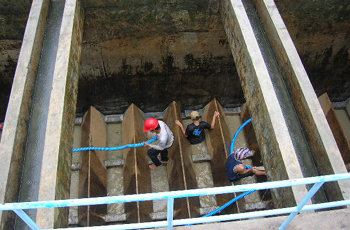|

At
work cleaning out a clarifier tank
Aceh Clam Chowdah
(continued)
By Freeman Anthony
For the first couple of weeks, my world consisted of NGO offices in
regal houses amongst drainage ponds, dusty palm trees, rice paddies
and the occasional burning trash heap. I spent my evenings at the office
more immersed in my work than ever before while the mosques droned away
outside. At the end of my second week, word came that we would look
to expand our treatment plant rehabilitation work on the North coast.
Rohan and I would go inspect the regional WTPs along the way to help
develop a proposal similar to the ongoing work at Lambaro.
Rohan was a rouge Australian with a convincing grasp of the local dialect
and a dozen years in the relief work game. He seemed to like the fact
that all we had to go on was a hastily assembled UNICEF brief with suspiciously
repetitive wording. IRD had also taken on a Bulgarian-born groundwater
specialist the size of a bear who would oversee the work in the North
coast area as it had stalled for who-knows-what reason. There were serious
water shortages in the region and we didn't have much to say about our
water sourcing efforts. High turnaround suggests that NGOs without good
stories of progress didn't keep funding for long.
Along the north coast I found a number of small portable treatment
plants that had been installed by previous well-meaning but short-termed
NGO programmes. As the expats disappeared, local village chiefs were
left with the responsibility to run equipment they had never seen before
and hardly understood. I could tell I, too, was part of this potentially
vicious cycle and noted that this issue needed to be brought up the
next time I spoke with the higher-ups that where controlling the money
and efforts.
The plants we found over the next four days were blue steel hulks in
all manner of location and condition. The Jabal Gapur plant was an hour's
ride into the hills above Beruen and had been bypassed six months after
it came online, because the operator and his wife had been shot by the
Aceh Rebels (GAM) to piss off the local government. A large multi-tank
plant further afield was overgrown with vines with an operations building
that had been torched to its foundation by GAM. The plants that did
manage to operate were either in town or had a healthy crew of Brimob
in residence along with their flock of chickens. The Girot Plant plant
had a sand bunker built on its reservoir and bullet marks in the tanks.
Every nightfall the distribution pumps would be shut off so the rebels
wouldn't benefit from the noise coverage for a night attack. The elaborate
Brimob insignias painted on the chlorine mixing tanks gave testament
to many an idle day standing guard over Beruen's non-potable water supply.
We spent our last day sorting out paperwork and attending a wedding
for one of our staff before we hit the road home through rabid monkey
country, high mountain plantain farms and ramshackle villages. Dark
natural wood stalls with corrugated tin roofs clustered along the crumbling
roadway all sold the exact same snack of deep-fried vegetable chips
ranging in colour from light yellow to deep red. Rohan signaled to Jemediah
to stop at one village and bought a few large bags of the chips. It's
tradition to buy presents for your friends when one is off traveling,
and they look forward to your return because of it. I had the feeling
Rohan was growing weary of this custom.
After ensuring our good names upon our return, we continued on to Banda
Aceh, stopping to gawk at an Asiatic Elephant milling about after a
day tilling vegetables. Rohan dozed in and out of consciousness as Jemediah
carved a suicidal path through scooters, lorries, busses, cars, and
water buffalo to get us home before dark. As we sped along I watched
our driver shoot quick glances to ensure Rohan was asleep and not paying
attention to his passing procedures.
Hard to say if it was the mayhem of the accepted road rules or a foolhardy
attempt to blend with the locals, but right about now I started smoking
cigarettes. Work had settled into a daily regiment of work and travel
intertwined with smoke breaks, lunch breaks, water breaks and prayer
breaks. I found myself lighting up with Rohan when we would find another
plant in some far off place. After getting all the information we could
from the operator and fiddling with whatever valves and pumps we could
find, it was time for a smoke as the sun grew lower over the jungle.
These were times of reflection on a time and place that to me, was socially
remote.
|